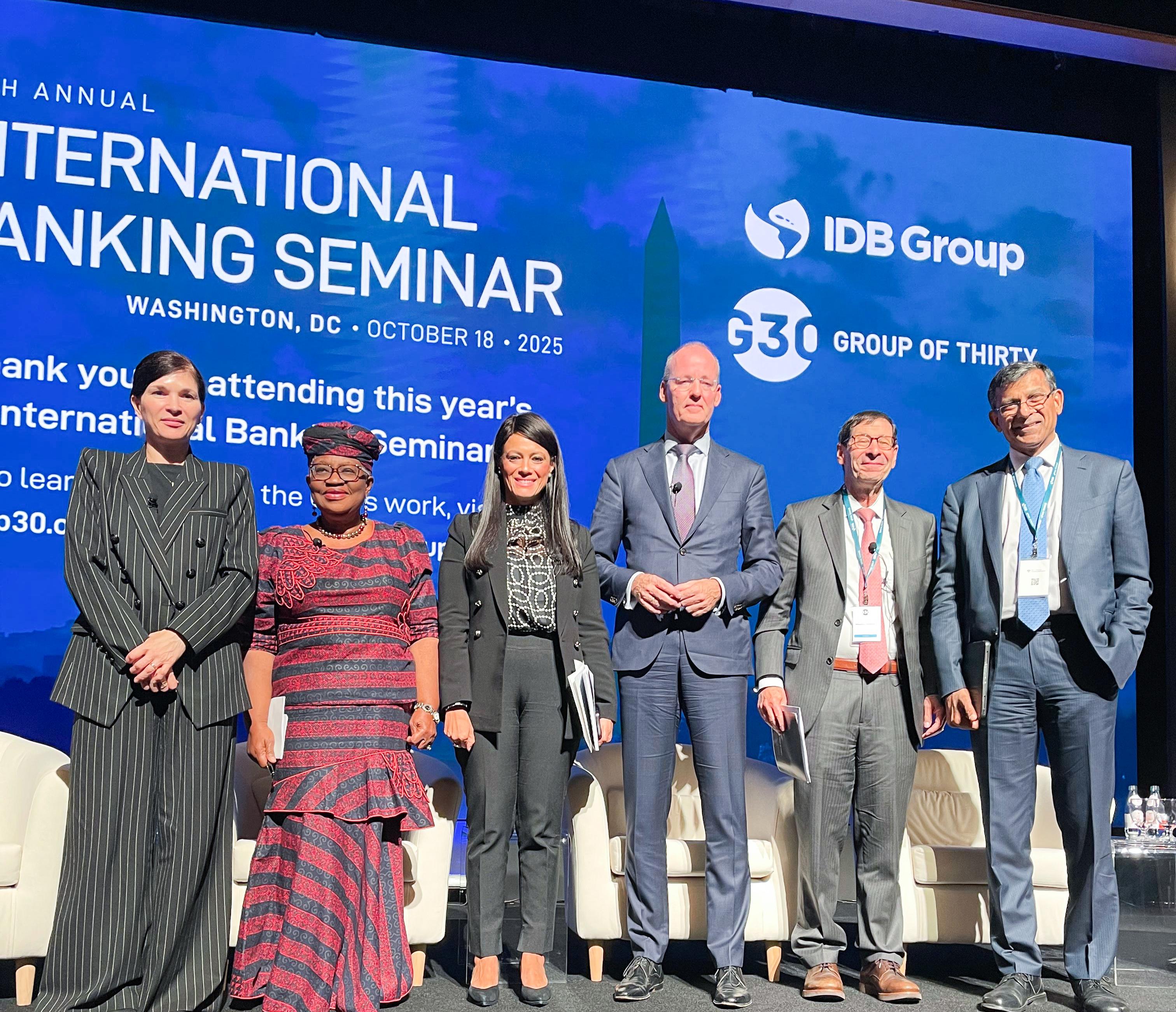Al-Mashat:
Escalating Debt Burdens in Emerging Economies Limit Fiscal Space Available for Development.
The Necessity of Governing the Global Financial System to Allow Greater Representation for Global South and Emerging Market Countries in International Institutions.
The Relationship between the IMF and World Bank and Member Countries is Shifting Towards Partnership in Designing and Implementing Development Policies.
International Financial Institutions Bear the Responsibility of Providing More Innovative Financing Alternatives to Encourage Investments.
At the conclusion of her visit to Washington to participate in the Annual Meetings of the World Bank Group, H.E. Dr. Rania El-Mashat, Minister of Planning, Economic Development, and International Cooperation, participated in a panel discussion on "Emerging Global Architecture" during the 40th Annual International Banking Seminar of the Group of Thirty in Washington.
The session was attended by Ms. Kristalina Georgieva, Managing Director of the International Monetary Fund (IMF), Ms. Christine Lagarde, President of the European Central Bank (ECB), Ms. Ngozi Okonjo-Iweala, Director-General of the World Trade Organization (WTO), and Mr. Ilan Goldfajn, President of the Inter-American Development Bank (IDB).
During her speech, Dr. Rania Al-Mashat highlighted the escalation of debt burdens in emerging economies due to challenges ranging from geopolitical turmoil to climate change. This limits the fiscal space available to these countries, while inequality gaps widen. She noted that the international financial system continues to face challenges in providing sufficient, timely, just, and comprehensive support.
Minister Al-Mashat stressed that "no one-size-fits-all model" exists, and each country has its own specific economic and social circumstances, necessitating tailored policies and programs. She reaffirmed that these developments make it imperative to shift the nature of crisis response from short-term measures to a focus on long-term structural reforms that enhance the path toward sustainable development and help reduce inequalities. This includes strengthening human capital, the core component of development, to build resilient capacities capable of withstanding future shocks.
Dr. Al-Mashat referred to a crucial issue: redefining global public goods. With escalating climate risks, when countries spend their resources to protect their people from the effects of climate change or environmental disasters, they are, in reality, contributing to the protection of the entire world. Consequently, it becomes essential to reconsider how these efforts are factored into debt sustainability analyses so that what countries do, not only for their own benefit but for the international community as a whole, is taken into account.
Minister Al-Mashat also mentioned global system governance, emphasizing the necessity for the voice of the Global South and emerging markets to be more present and influential within the governance structures of international financial institutions, mentioning several initiatives addressing this matter, including the "Bridgetown Initiative."
Dr. Al-Mashat pointed out that the programs currently implemented by both the IMF and the World Bank, based on the experience of countries dealing with them, confirm a greater degree of consistency and integration between their messages and approaches compared to the past. In these annual meetings, terms like "growth and job creation" resonate in every discussion, both within the IMF and the World Bank, reflecting a unified orientation towards linking financial stability with the developmental and social dimension. Furthermore, the relationship between countries and these international financial institutions is evolving from a purely financing relationship to a participatory one in designing national-level development policies.
Minister Al-Mashat spoke about the World Bank's evolution roadmap, noting its transformation into a Knowledge Bank, which grants it significant importance in supporting the design of policies based on knowledge and experience. This enhances the quality and efficiency of financing and supports efforts to exchange developmental expertise.
Dr. Al-Mashat underscored the launch of “Egypt’s Narrative for Economic Development: Reforms for Growth, Jobs & Resilience”, to transition toward a new economic model that focuses more on higher-productivity sectors with greater access to export markets. This leverages the accomplished sophisticated infrastructure, which serves as a supportive base for industrialization and investment, and redefines the state's role in the economy, thereby boosting the competitiveness of the Egyptian economy and stimulating private sector participation.
Dr. Al-Mashat clarified that international financial institutions today have a pivotal role in enhancing the exchange of expertise among countries, which fosters regional cooperation, particularly in the fields of trade and investment, as a positive outcome of the changes in the global economy. She stressed that international cooperation is the only way to collectively confront and overcome global shocks, noting that while available financing may not be sufficient to meet all needs, there are always innovative mechanisms to consider for attracting more private investment through risk mitigation.
